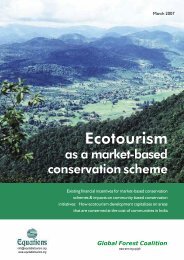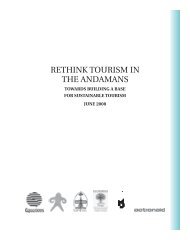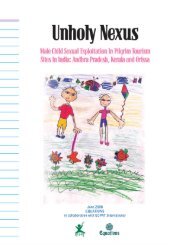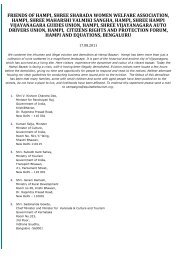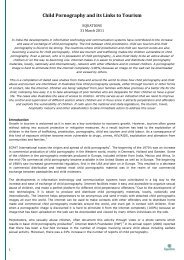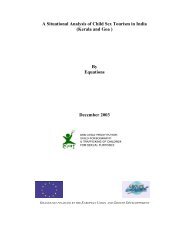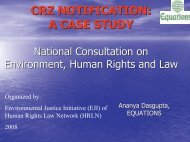Nilgiris Biosphere Reserve - Equitable Tourism Options
Nilgiris Biosphere Reserve - Equitable Tourism Options
Nilgiris Biosphere Reserve - Equitable Tourism Options
Create successful ePaper yourself
Turn your PDF publications into a flip-book with our unique Google optimized e-Paper software.
saving rare and precious resources, in particular water and energy, as well<br />
as avoiding so far as possible waste production, should be given priority and<br />
encouraged by national, regional and local public authorities.<br />
The Global Code of Ethics in <strong>Tourism</strong>, Article 5: <strong>Tourism</strong>, a beneficial<br />
activity for host countries and communities states that: 1. Local populations<br />
should be associated with tourism activities and share equitably in the<br />
economic, social and cultural benefits they generate, and particularly in the<br />
creation of direct and indirect jobs resulting from them.<br />
GATS and <strong>Tourism</strong><br />
While discussions on sustainable tourism development is taking place at one<br />
level there are widespread apprehensions on the happenings in conjunction<br />
with the global trade regimes. The General Agreements on Trade and<br />
Services (GATS) challenges the conservation and regulatory mechanisms<br />
envisaged for sustainable tourism development.<br />
Under the GATS classification of 12 service sectors, <strong>Tourism</strong> comes under<br />
the 9th category of "<strong>Tourism</strong> and travel related services". This is further<br />
divided into<br />
• Hotels and restaurants (including catering)<br />
• Travel agencies and tour operators' services;<br />
• Tourist guide services; and,<br />
• Other [unspecified)<br />
Environment in the GATS<br />
The environment is one of the basic resources of the tourism industry, as<br />
most forms of tourism are largely based on natural assets, such as beaches,<br />
the sea, mountains, forests, rivers or wildlife. Thus, environmental<br />
degradation can threaten the viability of the industry. Domestic governments<br />
under increasing pressure from critical groups may introduce protective<br />
measures in ecologically fragile areas. Pressures could be from<br />
Multinational Environmental Agreements and critical groupings within the<br />
country. Such measures could include limitations on the extent of <strong>Tourism</strong><br />
activities in the area like a limit on the number of tourist excursions,<br />
limitations on the number of resorts, or even certain concessions given to<br />
particular firms if they commit to employing local people and contribute to<br />
conservation activities in the area. These kinds of limitations, even if they are<br />
applied so as notto discriminate between local



